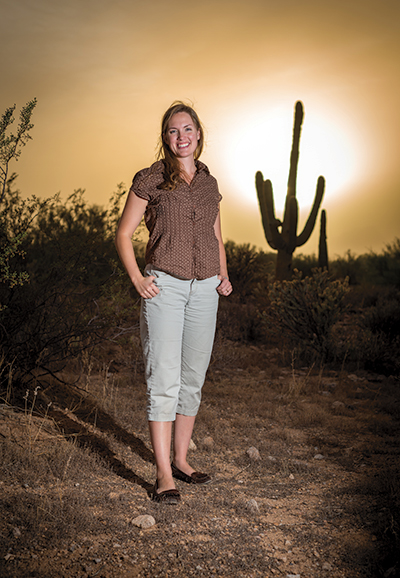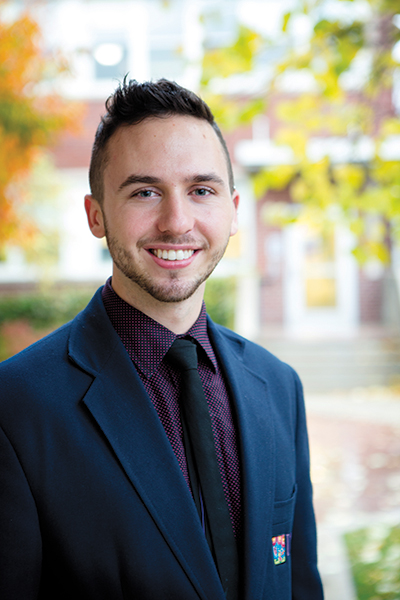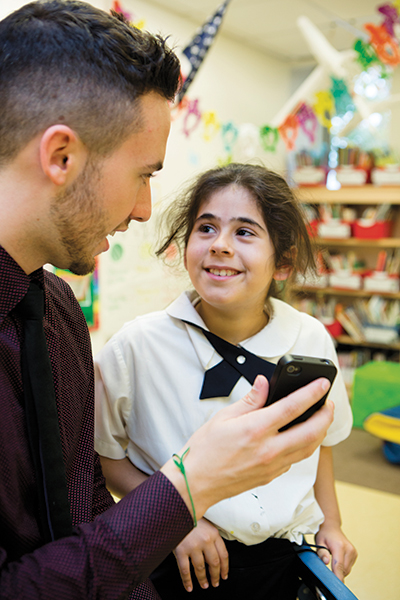
There is only one way to make it to your second year of teaching: survive the first. Those first 180 days can be a body-and-soul drowning, eye-opening marathon of chaos, inspiration and desperation—14 percent of all teachers in the United States leave the profession after just one year.
Marianne Kelly '08 and John McCarthy '11 have come out the other side and are second-year teachers with Teach for America, a nonprofit organization and member of the AmeriCorps national service network. They teach with the discipline of warriors determined to win the battles of life and literacy, and with the energy of artists trying to fashion new futures and heroes. They are not volunteers—they earn the same wages and benefits as other teachers at their schools—and they are earning their graduate degrees while they work.
A Serendipitous Meeting
Kelly, a psychology major with black belts in karate and kung fu, was a one-on-one special education paraprofessional in New Hampshire and a waitress on the side to fund a master's degree in education. One night a group of dinner guests at the restaurant where she worked turned out to be educators who introduced her to Teach for America. TFA's mission to provide an excellent education for the 16 million kids in low-income communities—and its message that poverty is not fate—resonated with Kelly. After a lengthy process, TFA assigned her to a two-year stint at an elementary school in west-central Phoenix where half the students are in English Learning Classes, and 100 percent receive free or reduced lunch.
With her classroom experience and five weeks of training at the TFA Summer Institute, Kelly was confident heading into her classroom of 26 students. Teaching, however, turned out to be harder than anything she had ever attempted.
“I thought it would be pretty easy. I worked four years in special ed and I was like, I got this, you know?” said Kelly. “The whole first year I felt like I was underwater, though. I had tremendous support from Teach for America, which helped, but this is the hardest job I have ever done. I go home, I eat dinner, and then I do lesson plans. It never ends; I had no idea how much work goes into teaching.”

There were times she felt she could not do it, times when the bell rang in the morning and she was so nervous she did not want to open the door. “I was so scared and struggled at first with classroom management, but TFA provided a coach for on-the-spot training, and with her help, the rest of the year went pretty well,” said Kelly.
She also learned firsthand about the barriers to getting a good education in the United States.
“A teacher can do a lot, but if the administration and the state and federal governments don't prioritize education, it won't happen. I am conservative, but the education of our children is just not put first in this country,” said Kelly. “I used to think it was the teachers' faults. They whine and complain; come on, they get the whole summer off. But there are so many things set up against these children, and it comes from home and the government. Our country would be different if we reduced class sizes and gave kids the interventions they need. A big problem with my students is the inability to read at grade level. It affects their entire lives.”
The rewards are not always immediate, and teachers know they will not reach every student, but when they do break through, the reward is enough to make them forget about the piles of papers to grade and the obstacles that both they and their students face.
Last year, one student really made Kelly want to pull her hair out. “He was a good boy, but he couldn't sit still. One day we made something that needed to be baked, and when I asked him to go with me to the cafeteria, he told me some heartbreaking things about his home life that explained his behavior.
“I got brave and called his mom. We were able to work together to help him do better in school. When I see him now, he runs up to me with big hugs, so I know I impacted him. That's one of my goals: I want my kids to learn about character, and I want them to be successful emotionally and academically.”
Character is important to Kelly, and she credits her martial arts background with building hers and helping her teach.
“Teaching is harder than getting your black belt. The kids do things that irritate you, but martial arts training has helped me remain calm. In martial arts you get beat up. You have to persevere. Last year was the hardest thing I have ever done, and I could have said it was too hard, but I stuck with it, just as I would in karate. I told Teach for America I would do this for two years, and I will.”

No Turning Back
While Kelly knew she wanted to be a teacher, John McCarthy was immune to the idea for years: His parents and sister are all teachers, and he wanted to find his own identity.
There were, however, signs along the way that hinted education was in McCarthy's future: He was a camp counselor, he worked with local schoolchildren as part of Colby-Sawyer's mentoring program, was a substitute teacher during breaks, and after college he was a YMCA program director. Everywhere he turned, there were children who needed guidance and support. He began to wonder how he might become a teacher with his degree in Communication Studies and searched the Internet. He'd never heard of Teach for America, but he spent days on its website, absorbed its mission and realized, even then, how much he had to learn about equal access to education.
As a suburban kid growing up in Saugus, Mass., McCarthy had a clear vision of his future: He would go to school and do well; then he would go to college. It was the order of things. That a child's zip code could negatively affect his or her education and employment options was a new problem of fate for McCarthy to ponder. Learning about TFA destroyed his naiveté, and once aware of the academic hurdles low-income children face, McCarthy could not walk away. That is how he ended up as a special education teacher at a charter elementary school dedicated to the Latino community in Chicago.
McCarthy's students are hearing and vision impaired, on the autism spectrum, and learning disabled. They wear uniforms, are silent in the hallways, and most, as in Kelly's class, receive free or reduced lunch.
A leader at Colby-Sawyer who had helped found a theater club and studied for a semester in Poland, McCarthy felt ready for the challenge of teaching, but he soon realized he was far from prepared. “The first year goes by so fast that you hardly have time to think or reflect,” he said. “It was chaotic, and sometimes it felt like too much to handle. I just looked forward to my second year.”
He wakes at 5:15 a.m. and does not return home till 10 p.m., after his graduate school classes. There is no time during the school day to plan for the next day, so he does that at night and on weekends. All the while, he wonders if his kids are safe and making good choices.
 “I work with students with disabilities, so my goal is their future. They are always on my mind,” said McCarthy. “My goal is for them to be able to live the most independent lives they can. For some that's going to mean going to college. For others, that's going to mean living in their own apartment. They need to know how to count money. They need to know how to tell time. They just have to be able to read— it's so important that they learn how to read at a level where they can navigate the world.”
“I work with students with disabilities, so my goal is their future. They are always on my mind,” said McCarthy. “My goal is for them to be able to live the most independent lives they can. For some that's going to mean going to college. For others, that's going to mean living in their own apartment. They need to know how to count money. They need to know how to tell time. They just have to be able to read— it's so important that they learn how to read at a level where they can navigate the world.”
Deeds Grow into Destiny
With most TFA corps members recruited from Ivy League and elite liberal arts schools, McCarthy feels fortunate to have stumbled across the organization. Thirty percent of teachers in the United States quit within their first two years, but both he and Kelly want to continue after they fulfill their TFA commitments. Where that will be is a mystery: McCarthy is keenly aware of the distance between Chicago and his family, and Kelly's new husband is waiting for her in California.
They will leave their Phoenix and Chicago schools with master's degrees and benefits reaped from Teach for America: federal loan forbearance, interest accrual payments, and education awards. Most important, they will leave with two years' experience and visions for their futures in the classroom. Kelly, for example, has fallen in love with phonics and reading instruction and wants to become a reading specialist.
McCarthy, following his family into education, is dedicated to using that same force to fight the fates many would assign his low-income and special-needs students. “There's such urgency for them to learn. They need to grow up politically engaged and conscious of the world they're in and know how to be good citizens,” said McCarthy. “My vision is that every kid needs a hero, whether parents or teachers or friends, but especially students with special needs. We spend time every day looking at heroes and what that word means. We spend time finding the heroes in them, too, because I want them to be independent, and I want them to be their own heroes. I want them to be able to advocate for themselves so that years from now, when their current heroes are no longer around, they will be able to continue on by being their own heroes.”
by Kate Seamans, College Communications


